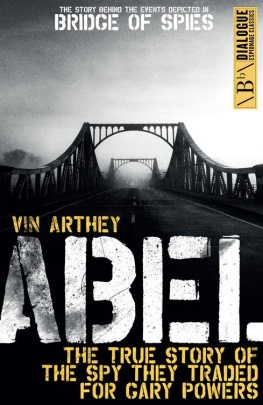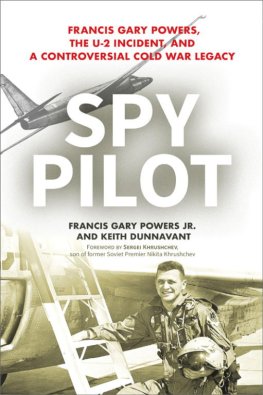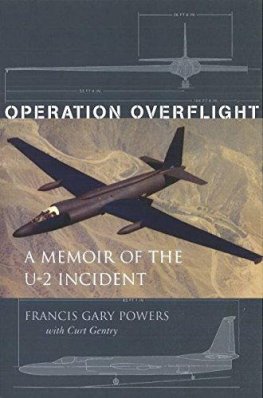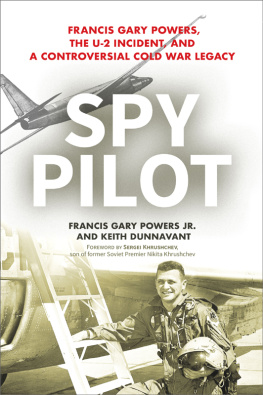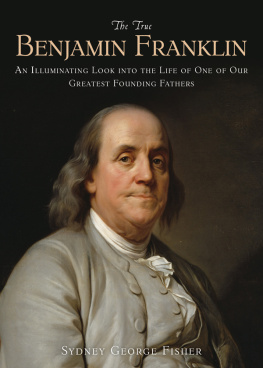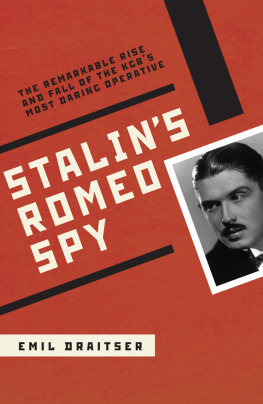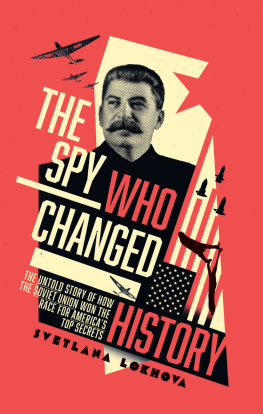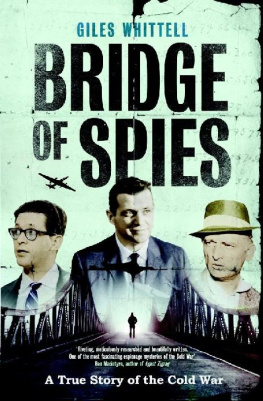This is a third edition of my biography of the spy known as Rudolf Abel, previously published under the titles Like Father Like Son: A Dynasty of Spies and The Kremlins Geordie Spy. Those to whom I remain indebted are Christopher Andrew, Arthur Andrews, Daniel Aravot, John Arnold, Robert Beatson, Calland Carnes, Ray Challinor, Ben De Jong, Vasily Dozhdalev, George Falkowski, Edward Gamber, Oleg Gordievsky, Ron Grant, Keith Gregson, Alex Heft, Maike Helmers, Per Oyvind Heradstveit, Frode Jacobsen, Knut Jacobsen, Lucy Jago, David King, Sergei Kondrashev, Lev Koshliakov, Boris Labusov, Colin Latham, Darren Lilleker, Anne McElvoy, Angus MacQueen, Richard Melman, Penny Minney, Robin Minney, Tom Mitchell, Dan Mulvenna, Melita Norwood, Linda Osband, Helge Ostbye, Chris Pocock, Colin Robinson, Charles Murray Roscoe, Dieter Sevin, Burt Silverman, Barry Stewart, Sean Street, Oleg Tsarev, Andrew Thorpe, John Wallwork and Nina Westgaard. Some people asked me to keep details of their help confidential and I continue to respect their wishes. I remain grateful to Natalia Kovalenko, Yelena Londareva, Oksana Silantieva, also to Konstantin Chistiakov, Maria Fedoseeva, Richard Miller, Nina Schrader-Nielsen and Rachel Viney who helped me find texts in Russian and Norwegian and translated passages for me. Not only did Geoffrey Elliott assist in finding and translating certain Russian material but his financial support enabled me to make my first visit to Moscow.
In my archive and library research I was indebted to Dilys Harding and her staff in Local Studies at Newcastle City Library, Eric Hollerton and Alan Hildrew at North Shields Library, Judith Etherton at the University of London Library, Martin Pegler at the Royal Armouries Museum in Leeds, Tish Collins and her team at the Marx Memorial Library, Lesley Richardson at the Laing Art Gallery in Newcastle upon Tyne, to Janet Coles and her staff at Bournemouth University Library and to all who assisted me at the National Archives. I am grateful for the help with the illustrations given by Jonathan Wardle, Stephen Murray, Ange Ferguson, Andy Price and Ken Slater.
The research and writing was undertaken when I was employed at Bournemouth University and at Teesside University. I record my thanks to Roger Laughton, John Foster, Su Reid and Chris Newbold. Also at Bournemouth, John Ellis and Julia Taylor assisted me in the application for University research funding that made possible a visit to Moscow in 2001.
There would have been no reincarnation of this work if it had not been for the perceptiveness and energy of Michael Smith at Biteback Publishing and I record my special thanks to him. I am grateful, too, for the editorial support of Jonathan Wadman and James Stephens at Biteback. Abel has benefited from new research and I now add Beth Amorosi, Michael Briggs (University Press of Kansas), John Donovan, Mary Ellen Fuller, Alan Myers, Anthony R. Palermo (who was Special Attorney with the team that prosecuted Rudolf Abel in 1957), Mark Palermo and Patrick Salmon to the cohort of those to whom I am indebted.
However, it is important to state that although I have sought and relied upon the help of many, the contents of this book, its speculations and any errors of fact or judgement, errors in translation or transliteration, are my responsibility. And the following persons in particular knew, or will know, this. Trevor Hearing was present at the very beginning of this work and has encouraged and enthused me from the outset. I shall always be grateful. The support and friendship of Nigel West has also meant a great deal to me, and his books The Illegals and The Crown Jewels have continued to be valuable reference points. Professor David Saunders, who first proved that William Fisher was born in Newcastle upon Tyne, Kirill Khenkin, who was one of Willie Fishers pupils, and Evelyn, Willies daughter, responded without fail to my every letter, call and question and I hope that this book will repay a little of the debt I owe them. My wife, Ann, has never complained about the amount of my time that I have put into this work and I would like my readers to know that without her certain support this book would never have been completed.
| AAS | The Anglo-American Secretariat of the Comintern (USSR) |
| Arcos | The All Russian Co-operative Society (USSR/UK) |
| ASA | Army Security Agency (USA) |
| ASE | The Amalgamated Society of Engineers (UK) |
| BSP | The British Socialist Party |
| CIA | Central Intelligence Agency (USA) |
| CPGB | The Communist Party of Great Britain |
| FBI | Federal Bureau of Investigation (USA) |
| GRU | Soviet military intelligence (Glavnoe Razvedyvatelnoe Upravlenie, Main Intelligence Directorate) |
| INO | Foreign department of Soviet state security (Inostrannyi Otdel) |
| INS | Immigration and Naturalization Service (USA) |
| IWW | Industrial Workers of the World |
| KGB | Committee for State Security (Komitet Gosudarstvennoi Bezopasnosti) (USSR) |
| KI | Committee of Information (Komitet Informatsii) (USSR) |
| MGB | Ministry of State Security (Ministerstvo Gosudarstvennoi Bezopasnosti) (USSR) |
| NKGB | Peoples Commissariat for State Security (Narodnyi Kommissariat Gosudarstvennoi Bezopasnosti) (USSR) |
| NKVD | Peoples Commissariat for Internal Affairs (Narodnyi Kommissariat Vnutrennikh Del) (USSR) |
| OGPU | Soviet intelligence service (Obyedinennoe Gosudarstvennoe Politicheskoe Upravlenie, Joint State Political Directorate) |
| OSS | Office of Strategic Services (USA) |
| RCMP | Royal Canadian Mounted Police |
| RSDRP | Russian Social Democratic Workers Party (Rossiiskaya Sotsial Demokraticheskaya Rabocbaya Partiya) |
| SDF | Social Democratic Federation (UK) |
| SIS | Secret Intelligence Service (UK) |
| USAF | United States Air Force |
| WSF | Workers Socialist Federation (UK) |
Names, the use and the spelling of names, are part of this story about the Fischer family, who were members of the German community in Russia from the middle of the nineteenth century. However, the distinctiveness of the German is lost when the name is transliterated into Russian. It sounds, and is spelt, Fisher. At various times, it was required that the Fishers formally and fully adapted the style of their names to the Russian custom, with a patronymic. Then, family members spent time in the West, where sometimes they had their name recorded in documents in the German fashion, sometimes in the English. Often, they may have settled for the easiest way out when registrars or clerks were completing documents for them. Moreover, there were many occasions in the twentieth century when it was prudent to choose one spelling over the other, usually the English rather than the German.
The father was known as, and usually wrote his name as, Heinrich Fischer; the son tended to write his name William Fisher. Predominantly, I have followed their custom. However, given the subject and the context of the story, Heinrich and William used other names as well, pseudonyms, code names and cover names (see the table overleaf). Willies wife also used and was known by the English name Helen, sometimes spelt Hellen, as well as the Russian Yelena, occasionally in the diminutives, Yelya or Ilya, but at home she was always called Ellie.

